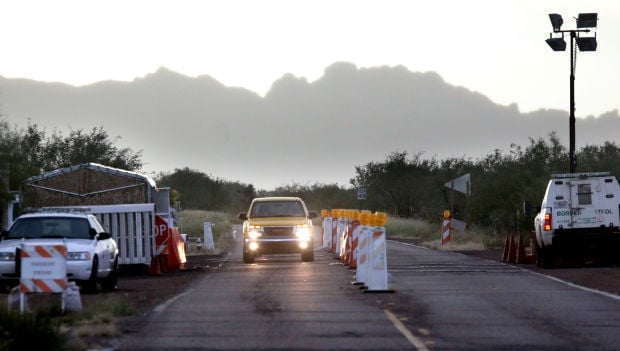Two Arivaca residents filed a federal lawsuit to challenge the U.S. Border Patrol’s alleged obstruction of their monitoring activities at the Amado checkpoint.
Peter Ragan and Leesa Jacobson of People Helping People, a community organization that has called for the elimination of the checkpoint since 2012, observe, record and collect data from the checkpoint south of Tucson on Interstate 19 at Arivaca Road. The monitoring began in February this year after many Arivaca residents reported civil-liberties violations, including invasive searches and harassment from agents.
Ragan and Jacobson say Border Patrol agents have “infringed and restricted their First Amendment rights by harassing, intimidating, retaliating against and threatening them with arrest,” according to a news release from the American Civil Liberties Union of Arizona.
“From the first day, we were met by agents who tried to keep us very far away from the proximity of the checkpoint,” Ragan said in an interview.
The Border Patrol established an “enforcement zone” by barricading the area and erecting signs that prohibit entry, keeping volunteer monitors 150 feet away from the checkpoint, he said. Agents also allegedly parked their trucks in the monitors’ line of sight to obstruct their view of the checkpoint and threatened them with arrest.
“We feel this enforcement zone is a violation of our First Amendment rights — our rights to observe and record agents in their public capacity,” he said.
Through the lawsuit, the two Arivaca residents are seeking a judicial order that would prevent agents from obstructing their monitoring. The case also notes disparate treatment, saying supporters of the Border Patrol have been allowed to stand closer to checkpoint than protesters.
Last month, the Arivaca residents group released a report with more than 100 hours of data gathered from monitoring activities. Findings showed that Latinos are more likely to face prolonged stops and secondary inspection than others at the checkpoint, which residents have to drive through on a regular basis to get to and from Arivaca.
“There couldn’t be a clearer demonstration of Border Patrol’s lack of transparency than literally preventing members of this community from observing the actions of agents in their own town,” said James Lyall, an attorney with the ACLU based in Arizona, in the news release.
In an interview, Lyall said that “citizens have a right to observe what government officials are doing and not be retaliated against.”
The government agency in question usually has 60 days to respond in cases like this. It can reply with an answer, a document disputing the claims made, or a motion to dismiss, saying why the case has no merit.
Lyall said he anticipates that the border agency’s argument will reference national security issues and claim their agents’ activities are different than those of other law enforcement agencies.
“The First Amendment applies to (federal agencies) just as it does other law enforcement agencies,” he said.
Victor Brabble, a spokesman for Customs and Border Protection, said the agency does not comment on pending litigation but released a statement saying, “Agents enforce the nation’s laws while preserving the civil rights and civil liberties of all people with whom CBP personnel interact.
“We are dedicated to continued meetings with local representatives and community members of Arivaca, Green Valley and Tubac to address their concerns and will continue to diligently protect and secure America’s borders by upholding authorities within the context of the U.S. search and seizure laws that regulate checkpoint operations,” he wrote in the email statement.
Ragan said the Arivaca residents group has not had any direct contact with agency officials. The only responses were “rejections,” he added.
“We believe that our best course is to continue to observe and document,” he said. “We’ll take it from there.”





